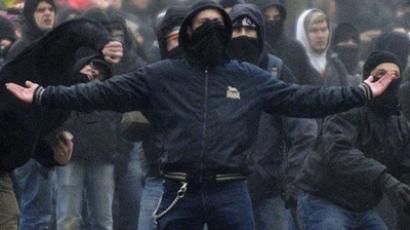Language inquisition: Estonia gets tough on Russian speakers
In a bid to escape its Soviet past, Estonia is forcing people to speak the local native language or risk losing their jobs. But the law, aimed at establishing a national identity, threatens to silence the Baltic state’s large Russian minority.
The social ad on a TV urges the Russian minority in Estonia to learn Estonian – in a rather amusing fashion. A Russian-speaking fisherman catches a magic fish. It promises – in Estonian – to fulfill all his wishes, but he does not understand the language and dumps it. But the reality is no joke at all.“All state officials are obliged to know Estonian in the course of their work. This is written in our language law. It also applies to people working in the majority of public services,” Mikhail Kilvart, deputy mayor of Tallinn. Just like other post-Soviet Baltic states, Estonia has its own language inspectorate – a body which oversees how the language law is being observed. At times, laying that law down quite harshly.According to the Language Inspectorate, the so-called the “language police”, have been examining the use of Estonian in the everyday work of Narva authorities from October to November. They discovered that Narva City Council was conducting most of its meetings in Russian. The language inspection has the legal right to conduct spontaneous checks on anyone working in any sphere. And should a person fail the Estonian exam, the body then may initiate the sacking of this employee. Human rights activists say this has turned the language inspection into a punitive body.It is not that they have nothing to say, it is just that they believe their voices are being silenced. Estonia’s 300,000-strong Russian minority has been protesting at what they describe as a “language inquisition”. Some of these people have either lost their jobs or are under threat of doing so, simply because they are forbidden from speaking their native language.“The so-often-cursed Soviet power never applied any restrictions on languages. Estonians were free to educate in their language. Nowadays the authorities have almost banned Russian from schools. Besides, some Russian communities don’t have qualified teachers who can teach physics or chemistry in Estonian,” Sergey Tseulin, “NochnoiDozor” (NightWatch) movement, leaderIn the latest twist, five workers at an orphanage were fired for not being able to speak Estonian to the children. That is in a town, where 96 per cent of the population are ethnic Russians.“I don’t want to sound rude, but as long as we live in this country we have to live by the law. And I fired those people because they had been warned, but did nothing,” Mare Vialja, director of the Narva orphanage.Human rights activists acknowledge the rule of law, but stress that in the language case it is not applied properly.“The law doesn’t observe any difference between Narva – where almost everyone sees Russian as their native language – and other parts, where most of the people speak Estonian. And with such disproportion we can talk of direct language discrimination and indirect ethnic discrimination,” said Vadim Poleschuk, a human rights activist.Activists in another Baltic state, Latvia, have been gathering signatures on holding a referendum to make Russian the second state language. And many say they have a strong chance of pushing it through.Estonia, despite being criticized by Amnesty International for its language policy, is adamant. And it seems the Russian minority will not catch the magic fish granting their every wish anytime soon.














